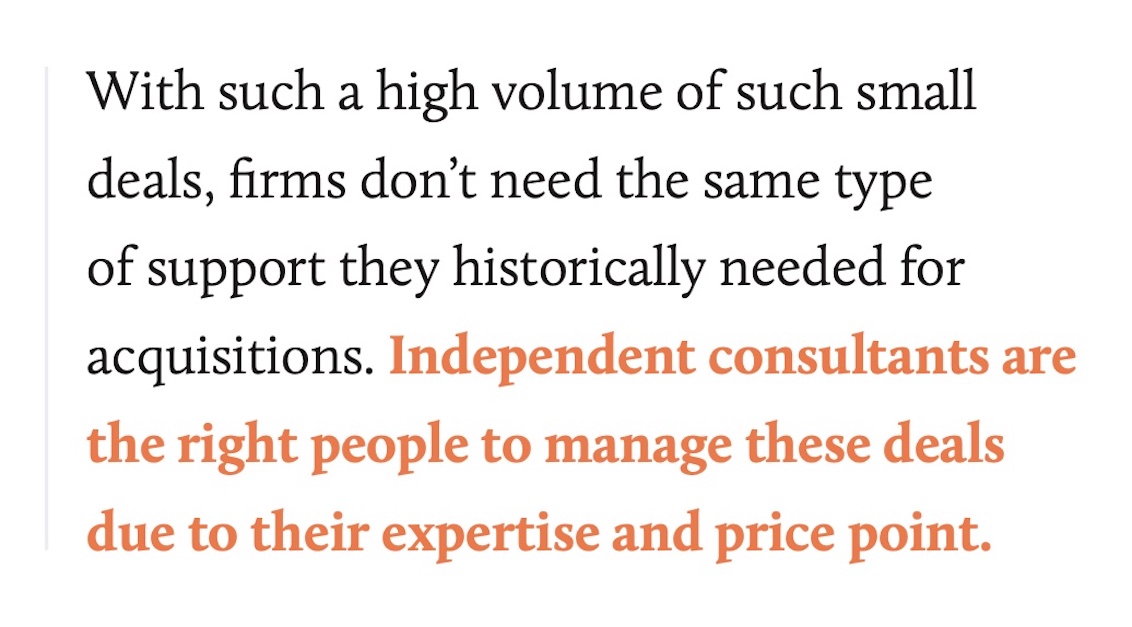Consulting for Private Equity: Why PE Prefers Independent Consultants

As a leader at a top private equity firm today, you’re likely interested in growth through acquisition in adjacent markets. Before putting any money on the table, your team must analyze those markets in question.
However, due to capacity constraints, full-time staff may not have the time or resources necessary to dedicate to the work. In this case, the firm needs external support from a subject matter expert who can quickly provide an accurate “first look” at the adjacent market to determine whether an acquisition makes sense. With speed as a driving factor, you choose to hire an experienced independent consultant who’s fluent in the market to manage diagnostics and offer the insight your team needs to make an educated decision.
Whether it’s work like this, or any other type of project across the deal cycle such as formulating and executing value creation workstreams, today’s top private equity firms are choosing to work with independent consultants — here’s why.
Consulting for Private Equity: 4 Reasons Why Firms Prefer Working With Independent Consultants
1. Gain niche subject matter expertise and a competitive edge.
Independent consultants help close industry knowledge gaps and provide an outside perspective to give your firm a competitive edge during diligence. Traditional consultants from high-end firms are often generalists with similar backgrounds, and may not provide the project deliverables and unique insights that your firm requires for certain deals.
Instead, an independent consultant, who may have worked at a high-end firm before moving into an independent and more specialized role, offers niche subject matter expertise and perspective that gives your firm a competitive edge before, during, and after a deal.
2. Enable swing capacity.
Whether you’re dealing with complex projects across your portfolio or capacity constraints at the firm level, having a pool of independent consultants at the ready means you’ll have swing capacity. Unlike full-time staff and traditional consulting firms, independent consultants enable you to flex capacity up and down on a dime, which can be especially valuable during times of high M&A activity.
With support from independent consultants, your firm can easily and efficiently staff niche and strategic projects both proactively (through the creation of a virtual talent bench based on gaps that you have) or reactively (due to market changes and unforeseen opportunities).
3. Improve operational efficiency.
Many private equity firms and enterprises alike spend millions of dollars every year on big consulting. They pay a massive margin only to work with a Partner who oversees a team of generalist consultants who execute your work.
That’s why today’s top private equity firms are increasingly hand-picking the highly-qualified independent consultants who they want to develop strong working relationships with. Working with independent consultants streamlines communication, collaboration, and transparency, and is more cost-efficient overall. Your firm will also benefit from:
- The same, if not greater (due to specialization and diverse work experience), level of expertise as you would get from working with a big consulting firm
- A naturally leaner consulting strategy (since working with independent talent requires less full-time and traditional consulting capacity)
- Consistent insight into the projects independent consultants are working on
- A close partnership with your portfolio companies to choose the exact resources that they’re using
4. Run at more deals including tuck-ins and roll-ups.
Even during times of economic hardship, private equity firms are known to find effective ways to expand their portfolios and grow. One tactic is investing in dozens of small and valuable tuck-ins and roll-ups.
Due to the nature and size of these acquisitions, firms prefer working with independent consultants rather than big consulting firms. As an independent consultant on the Catalant Platform, Sean O’Dowd, says:

Principal at The O’Dowd Group LLC, former BCG, Wharton
Independent consultants then continue to support and manage post-close activities to drive integration work streams and help the business realize synergies.
Ready to learn more about how independent consulting for private equity can drive value at your firm?
Let’s TalkRelated Articles
Share Article












